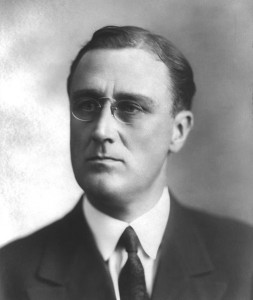Fear: Good for the Job Market?

FDR/Photo: Wikipedia
“So, first of all, let me assert my firm belief that the only thing we have to fear is fear itself — nameless, unreasoning, unjustified terror which paralyzes needed efforts to convert retreat into advance”—Franklin D. Roosevelt, inaugural address, March 4, 1933.
FDR’s oft-quoted mid-depression inaugural rallying cry, “The only thing we have to fear is fear itself”, encapsulated an ostensible fundamental principle and fact of economic life: Macro- and micro-economic life, including job markets , can hinge on the absence of fear for its sustenance, if not also continuing growth.
In the midst of that drought and depression era, fear fed deer-in-the-dimming lights paralysis: Fear of the consequences of assets wiped out in a market crash or a bank failure, fear of lost purchasing power, fear caused by unsold inventory, fear caused by layoffs that cause decreased consumer spending, which caused fears of and actual further decreases in investment and so on, in the kind of vicious cycle that can be triggered at many points within it, starting, for example, with a burst stock-market bubble, mortgage scandals, lost investment, jobs and savings or with credit contraction and reduced money supply.
Dearth of Demand and Payment, Death of Jobs
Imagine the simplest possible economy, one consisting of two potentially productive people possessed of the talent, resources and time to produce goods and services, yet afraid to produce anything to exchange because of the fear there will be no demand, or because there will be only give, but no get (i.e., that there will be payment default). No demand means no job; no payment means pointless job. Unless commanded to do so by a third, well-armed party, this minimal economy will seize up and its members will be forced to fend and provide for themselves—amply demonstrating that “labor” and “job” are not synonymous, a difference that, ideally, a recruiter aims to obliterate.
Productive and Constructive Fear
On the other hand, fear did help the world pull out of its depression-era economic Stuka dive-bomber nosedive: Fear of Hitler, Hitler and Mussolini, which stimulated the U.S. economy even before formal entry into WW II. So, in retrospect, FDR’s maxim was not entirely correct—and, in a sense, was misleading.
Even in peacetime, some companies always trade in fear, as have military contractors since their earliest appearance on the stage of history—and as have pharmaceutical and cosmetics companies hawking products such as Viagra and Botox (which demonstrates that not only military hawks hawk). So fear and its effects are not necessarily to be feared—and indeed may be highly desirable as product, service and job creators.
Equally obviously, some employers ,e.g., those employers who can exact more labor from or obstruct union organizers among their workforces, profit from the fears of the precariously employed, the unemployed and the underemployed by pitting the fears of these groups against each other. This too dilutes the wisdom of FDR’s aphorism.
The Fear of Desire and Job Outsourcing
Actually, the reverse of the “only thing to fear is fear” idea seems to better describe some aspects of modern developed economies and job markets: “The only thing to fear is desire.” Consider the dramatic decade-long decline in the numbers of manufacturing and service of jobs through outsourcing—a trend that Ambrose Evans-Pritchard, International Business Editor of The Daily Telegraph, sees as reversing soon, amid the restoration of American power and influence he is predicting (in his article, “World power swings back to America”, published October 24, 2011).
Arguably, the desire for bigger profit margins through lower wages, lower taxes, etc., has motivated much of the dramatic lobbing-of-jobbing to overseas venues. Although to characterize such massive outsourcing as fear-driven is possible—since, as Freud noted a century ago, our fears often mask our desires and vice versa, the impetus to outsourcing seems to have been primarily perceived opportunity, rather than perceived crisis—at least initially, before competition from other out-sourcing corporations stoked fears of being unable to keep up with them.
Now, ask yourself this: As a recruiter, what inspirational message do you want to communicate to your clients—the job-seekers and the particular company doing the hiring? Do you think you can serve them, the economy and yourself by preaching “The only thing we have to fear is fear itself”, or not? If you concur with FDR, you will accentuate the positive job and corporate news and data to fuel hope, desire and hiring—but without contributing to the kinds of hopes and desires that lead to outsourcing and job loss., or hopes and desires for easy riches that led to the subprime mortgage and (some say) looming derivatives crises.
You will, at the same time, downplay the productive role of economically (if not morally/culturally) constructive fear, e.g., in the pharmaceutical and weapons sectors of the economy. You will also not communicate any or many useful and cautionary fears about the multi-trillion-dollar global derivatives (including naked default swaps) markets or the stubbornly high unemployment rate—concerns, which, if voiced vociferously enough, might spark some fresh policy thinking.
On the other hand, you may choose to modify FDR’s dictum this way: “The only thing to fear is fear itself and some greedy people’s desires.” Now that is more balanced and accurate, even if it doesn’t have the same pithiness of FDR’s original (itself a variant of Seneca the Younger’s scies nihil esse in istis terribile nisi ipsum timorem, i.e., “You will understand that there is nothing dreadful in this except fear itself”).
Or, you may not wish to choose any inspirational message at all—choosing instead to merely do your job of leading and following, without thought of inspiring. That is, indeed, possible.
But, just as it makes for a less effective and impressive president, it is also the mark of a less effective and impressive recruiter.

